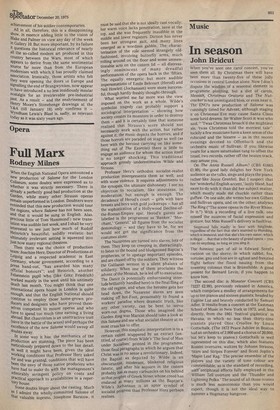Opera
Full Marx
Rodney Milries
When the English National Opera announced a new production of Salome for the London Coliseum, some doubts were expressed as to Whether it was strictly necessary. There is already a perfectly good bad production at the Garden, while many other Strauss operas remain unperformed in London. Doubters were reminded that this new production would tour the regions, where Salome has not been seen, and that it would be sung in English, Alas, precious little of Tom Hammond's new translation was audible last week, and I shall be very interested to see just how much of Rudolf Heinrich's beautiful, solidly realistic but ultimately irrelevant setting is squeezed into just how many regional theatres. Then there was the choice of production team: Joachim Herz, Director of Productions at Leipzig and a respected academic in East Germany, whose government, according to a Press hand-out, "has awarded him many Official honours"; and Heinrich, another Felsenstein pupil who (like GOtz Friedrich) Worked mainly in the west until his untimely death last month, You might think that one international opera house in London is quite enough, and that the English National should continue to employ those home-grown producers and designers who have proved themselves competent to mount operas and who have to spend too much time earning a living abroad. But chauvinism is an unattractive trait (save in the battle of the sexes) and perhaps the excellence of the new Salome would sweep all doubts away. In soMe way it has: the mechanics of the Production are stunning. The piece has been Meticulously prepared down to the last detail, as well it might have been, given the ideal Working conditions that Professor Herz asked for and was grantecl, conditions that will have been the envy of those native producers who have had to make do with the management's admirably stringent policy on costs and Practical approach to availabilities in a repertory house.
Some doubts linger about the casting. Much as I admire the wholly-Committed Salome of that valuable soprano, Josephine Barstow, it must be said that she is not ideally cast vocally; her warm voice lacks penetration, save at the top, and she was frequently inaudible in the middle and lower registers. Diction has never been her strongest suit, and many lines emerged as a wordless gabble. The characterisation of the role seemed strangely oldfashioned, involving butterfly arms, much rolling around on the floor and some unmentionable acts on the cistern lid — all distressingly reminiscent of many dreadful performances of the opera back in the 'fifties. The equally energetic but more audible impersonations of Emile Belcourt (Herod) and Neil Howlett (Jochanaan) were more successful, though hardly freshly thought-through. What worried me far more was the view imposed on the work as a whole. Wilde's symbolist tragedy can probably support a sociological interpretation — showing how society creates its monsters in order to destroy them — and it is certainly time that someone realised that Strauss's score should not necessarily work with the action, but rather against it; the music depicts the horrors, and if those horrors are paraded on stage as well (as here with the heroine carrying on like something out of The Exorcist) there is little to engage an audience for whom the action itself is no longer shocking. This traditional approach grossly underestimates Wilde and Strauss.
Professor Herz's orthodox socialist-realist production misrepresents them as well, and with some violence. It requires adjustments to
the synopsis, the ultimate dishonesty. I see no objection to socialism, like stoutness, in moderation, but enough is enough. The decadence of Herod's court — girls with bare breasts and boys with gold jockstraps — has all the sophistication of a Hollywood Decline-ofthe-Roman-Empire epic. Herod's guests are labelled in the programme as 'Banker,' Merchant,"General,' all figures from the socialist demonology — and they have to be, for we .would not get the significance from the
costumes alone.
The Nazarenes are turned into slaves, lots of them. They keep on creeping in, distractingly, to listen to the bound and bludgeoned Baptist's prophecies, or to upstage important episodes, and are chased off by the soldiers. They witness the Galilaean sermon in a silent phalanx of solidarity. When one of them proclaims the advent of the Messiah, he is led off to execution. The Dance (a potentially embarrassing interlude brilliantly handled here) is the final fling of the old regime, and when the heroine gets her head down, the Nazarene slaves are seen making off hot-Foot, presumably to found a workers' paradise where dramatic truth, like any other variety, can be bent to serve worn-out dogma. Those who imagined the Garden Ring was Marxist should take a look at this Salome and see what socialist theatre at its most crass has to offer.
However, this simplistic interpretation is to a certain extent scuppered by an extract (untitled, of course) from Wilde's 'The Soul of Man under Socialism' printed in the programme, those final paragraphs in which he argues that Christ was in no sense a revolutionary. Indeed, the Baptist as depicted by Wilde is an obscurantist, intolerant, blinkered religious fanatic, and after his sojourn in the cistern probably has as many carbuncles on his behind as that prophet of Greek Street whose creed has enslaved as many millions as the Baptist's. Wilde's Jochanaan is an apter symbol of socialist progress than Professor Herz perhaps
.realises.


































 Previous page
Previous page